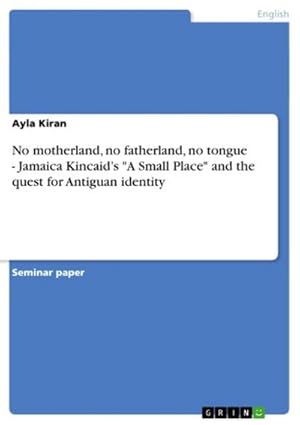Kiran Ayla (2 results)
Product Type
- All Product Types
- Books (2)
- Magazines & Periodicals
- Comics
- Sheet Music
- Art, Prints & Posters
- Photographs
- Maps
-
Manuscripts &
Paper Collectibles
Condition
- All Conditions
- New
- Used
Binding
- All Bindings
- Hardcover
- Softcover
Collectible Attributes
- First Edition
- Signed
- Dust Jacket
- Seller-Supplied Images
- Not Printed On Demand
Seller Location
Seller Rating
-
No motherland, no fatherland, no tongue - Jamaica Kincaid¿s "A Small Place" and the quest for Antiguan identity
Published by GRIN Verlag, 2007
ISBN 10: 3638674851ISBN 13: 9783638674850
Seller: AHA-BUCH GmbH, Einbeck, Germany
Book
Taschenbuch. Condition: Neu. Druck auf Anfrage Neuware - Printed after ordering - Seminar paper from the year 2005 in the subject American Studies - Literature, grade: 2,0, University of Hamburg (Insitut für Anglistik und Amerikanistik), course: 'I Could Tell You Stories' American Autobiography 1960 to the Present, language: English, abstract: Literature on the Caribbean, as Caribbean historiography, has been shaped by white, rich and powerful men: it mostly told the story of someone who had all means - economical, political and cultural, so basically all resources denied to the subaltern - to retell the tale in his favor. Jamaica Kincaid's A Small Place4 provides a deeply satisfying response to until-then existing chauvinist, Eurocentric and often-times racist representations of Antigua and its people. The book describes Kincaid's native Antigua with highly critical perspectives on its colonial history, on its exploitation by the British, on its corruption after independence, and on the continuing exploitation through tourism today. The book, which made Kincaid persona non grata on Antigua for years after it was first published, is not afraid to attack all of those whom the 'I'- narrator considers responsible for the deplorable state of affairs, both in the past and the present.A Small Place consists of four parts, in which the narrative 'I,' a native of Antigua with a biography very similar to Kincaid's own, introduces the reader to the island. The first part concentrates on tourism, which is seen as a prolongation of colonialism, with the tourists merely replacing the British colonial power. The second part explores the island's colonial past, slavery, memories of the narrator's childhood under English rule, and the effects of colonial history still visible in Antigua today. Part three denounces the political corruption of the post-independence Antiguan government, and part four analyses the effects of colonialism on the minds of people who have come to believe they are living on the periphery of history. Using Spivak's thesis as the theoretical framework, I will analyze Kincaid's contribution to giving the subaltern a voice, and to formulating an Antiguan identity. In this paper, I am going to point out Kincaid's contribution to this endeavor, which, in my opinion, is bigger than an initial reading of the text, which is entirely addressed at a 'you', a secondperson tourist reader, would suggest. Where does A Small Place lead her reader, and where does Kincaid leave him.
-
Die scheinbare Wandlung der islamischen Gemeinschaft Milli Görüs
Published by GRIN Verlag, 2008
ISBN 10: 3638903451ISBN 13: 9783638903455
Seller: AHA-BUCH GmbH, Einbeck, Germany
Book
Taschenbuch. Condition: Neu. Druck auf Anfrage Neuware - Printed after ordering - Studienarbeit aus dem Jahr 2004 im Fachbereich Geschichte Europa - and. Länder - Neueste Geschichte, Europäische Einigung, Note: 1,5, Universität Hamburg (Insitut für Geschichtswissenschaft), Veranstaltung: Historische Wurzeln des Islamismus in Nordafrika/Nahost, 28 Quellen im Literaturverzeichnis, Sprache: Deutsch, Abstract: Diese Arbeit beschäftigt sich mit der größten in Deutschland ansässigen Vereinigung von Muslimen, der Islamischen Gemeinschaft Milli Görüs (IGMG). Die Wichtigkeit dieses Themas erklärt sich nicht nur durch die Omnipräsenz der Organisation im Leben hier ansässiger Türken und durch die zahlenmäßige Überlegenheit über andere hier aktive Gruppen, sondern auch durch die immer weiter gehende öffentliche Akzeptanz von Milli Görüs im öffentlichen Leben. Milli Görüs-Funktionäre werden immer häufiger als Gesprächspartner für christlich-islamischen Dialog geladen, so zum Beispiel bei Veranstaltungen der Heinrich-Böll-Stiftung oder der Friedrich-Ebert-Stiftung. Der deutsche Verfassungsschutz sieht die Gefahr, die von Milli Görüs ausgeht, nicht in ihrem vermeintlichen Gewaltpotential oder gar in der Beherbergung von Terroristen. Milli Görüs verfolgt einen Staat im Staate , Minderheitenrechte für Muslime in Deutschland, eine Islamische Identität und die Promotion eines muslimischen Selbstwert- und Überlegenheitsgefühl. So sagte Milli Görüs Mitglied und Vorsitzender des Islamrats in Deutschland, Hasan Özdogan, auf einer Tagung der Friedrich-Ebert-Stiftung im Jahr 2000: Als Muslime leben wir in Europa in der Minderheit und können nur einen Teil der Scharia leben. Wir wissen, auf welchem Boden wir hier stehen. Wenn Rechtssicherheit und die freie Religionsausübung gewährt sind, können wir in Deutschland leben.



